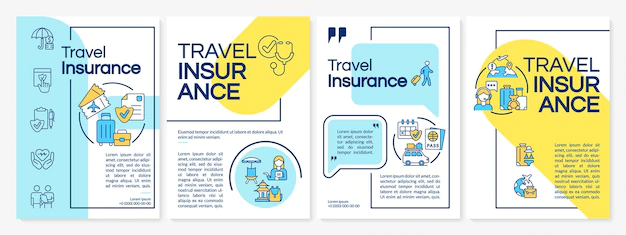There are several types of travel insurance you’ll want to evaluate before choosing the policy that’s right for you. A few of the most popular types of travel insurance include:
- Select insurance plans offer some or a combination of the following COVID-19-related protections: coverage for rapid or PCR testing; accommodations if you’re required to quarantine during your trip if you test positive for coronavirus; health care; and trip cancellations.
- Cancel for any reason insurance: Cancel for any reason travel insurance works exactly how it sounds. This type of travel insurance lets you cancel your trip for any reason you want – even if your reason is that you simply decide you no longer want to go. Cancel for any reason travel insurance is typically an add-on you can purchase to go along with other types of travel insurance, and is good supplementary insurance to have if you’re concerned about COVID-19 affecting your trip. For that reason, you will pay more to have this kind of coverage added to your policy.
Also, note that this type of coverage typically only reimburses 50% to 75% of your nonrefundable prepaid travel expenses. You’ll want to make sure you know exactly how much reimbursement you could qualify for before you invest in this type of policy.
- International travel insurance: Travel insurance is especially useful when traveling internationally, as it can provide medical coverage for emergencies (in some cases for COVID-19) when you’re far from home. Depending which international travel insurance plan you choose, this type of travel insurance can also cover lost or delayed luggage, rental cars, travel interruptions or cancellations, and more.
- Cheap travel insurance: If you want travel insurance but don’t want to spend a lot of money, there are plenty of cheap travel insurance options that will offer at least some protections (and peace of mind). Many travel insurance companies allow you to customize your coverage, spending as little or as much as you want.

- Trip cancellation, interruption and delay insurance: Trip cancellation coverage can help you get reimbursement for prepaid travel expenses, such as your airfare and cruise fare, if your trip is ultimately canceled for a covered reason. Trip interruption insurance, on the other hand, kicks in to reimburse you if your trip is derailed after it starts. For instance, if you arrived at your destination and became gravely ill, it would cover the cost if you had to cut your trip short.
Trip delay insurance can help you qualify for reimbursement of any unexpected expenses you incur (think: lodging, transportation and food) in the event your trip is delayed for reasons beyond your control, such as your flight being canceled and rebooked for the next day. You will want to save your receipts to substantiate your claim if you have this coverage.
- Lost bags or personal belongings: Coverage for lost or stolen bags can come in handy if your luggage is lost by your airline or your luggage is delayed so long that you have to buy clothing and toiletries for your trip. This type of coverage can kick in to cover the cost to replace lost or stolen items you brought on your trip. It can also provide coverage for the baggage itself. It’s even possible that your travel insurance policy will pay for your flight home if damages are caused to your residence and your belongings while you’re away, forcing you to return home immediately.
- Travel medical insurance: If you find yourself sick or injured while you are on vacation, emergency medical coverage can pay for your medical expenses. With that in mind, however, you will need to find out whether the travel medical insurance you buy is primary or secondary. Where a primary policy can be used right away to cover medical bills incurred while you travel, secondary coverage only provides reimbursement after you have exhausted other medical policies you have.
You will also need to know how travel medical coverage you purchase deals with any preexisting conditions you have, including whether you will have any coverage for preexisting conditions at all.
- Evacuation insurance: Imagine you break your leg while on the side of a mountain in some far-flung land without quality health care. Not only would you need travel medical insurance coverage in that case, but you would also need coverage for the exorbitant expense involved in getting you off the side of a mountain and flying you home where you can receive appropriate medical care.

Evacuation coverage can come in handy if you need it, but you will want to make sure any coverage you buy comes with incredibly high limits. According to Squaremouth, an emergency evacuation can easily cost $25,000 in North America and up to $50,000 in Europe, so the site typically suggests customers buy policies with $50,000 to $100,000 in emergency evacuation coverage.
- Cruise insurance: Travel delays, missed connections, tours or excursions, and cruise ship disablement (when a ship encounters a mechanical issue and is unable to continue on in the journey) are just a few examples why cruise insurance can be a useful protection if you’ve booked a cruise vacation.
- Credit card travel insurance: It is not uncommon to find credit cards that include trip cancellation and interruption coverage, trip delay insurance, lost or delayed baggage coverage, travel accident insurance and more. Cards that offer this coverage include popular options like the Chase Sapphire Reserve Credit Card, the Chase Sapphire Preferred Credit Card and The Platinum Card from American Express.
Note that owning a credit card with travel insurance protection is not enough for your coverage to count: To take advantage of credit card travel insurance, you must pay for prepaid travel expenses like your airfare, hotel stay or cruise with that specific credit card. Also, note that credit cards with travel insurance have their own list of exclusions to watch out for. Many also require cardholders to pay an annual fee.








